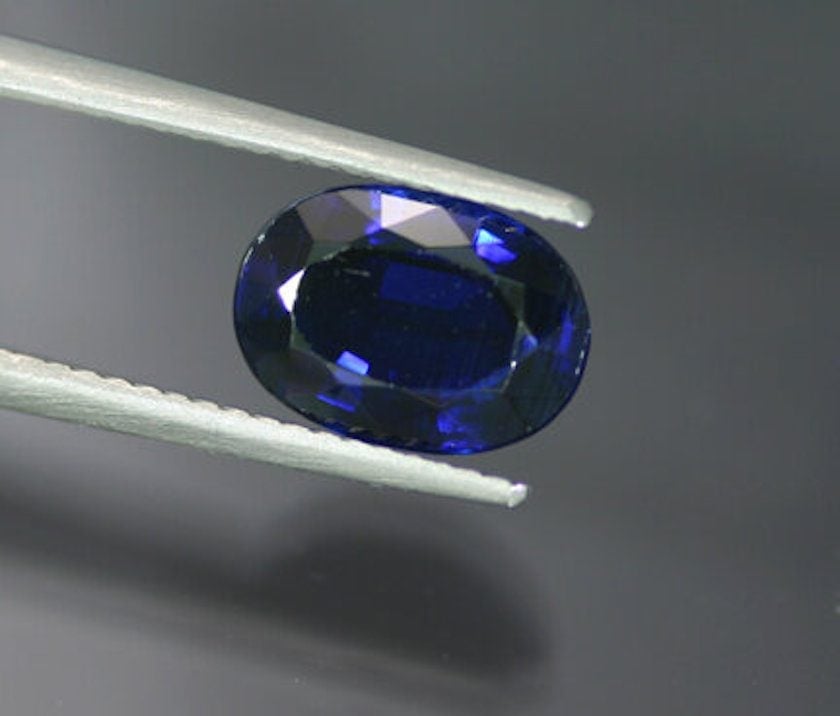Kyanite Value, Price, and Jewelry Information
Kyanite’s physical properties make it very difficult to facet. However, it’s a popular collector’s gem, especially in sapphire-blue colors.
3 Minute Read
Kyanite’s physical properties make it very difficult to facet. However, it’s a popular collector’s gem, especially in sapphire-blue colors.
Start an IGS Membership today
for full access to our price guide (updated monthly).Kyanite Value
In this video, Jake Talve-Goodman of The Concierge Gemologist introduces viewers to the world of kyanite and discusses its sourcing, formation, symbolism, and jewelry use.
What is Kyanite?
Kyanite is an aluminum silicate mineral that's notoriously difficult to facet because of its perfect cleavage and variable hardness, even within the same crystal. When cut parallel to its (long) c-axis, it has a hardness of 4 to 4.5. When cut perpendicular to its c-axis, it has a hardness of 6 to 7.5.
Kyanite is polymorphous with andalusite and sillimanite. These gems share the same chemistry but have different crystal systems.
Does Kyanite Make a Good Jewelry Stone?
Due to their variable hardness, kyanites in rings should have protective settings. These gems make great options for other jewelry uses, such as in earrings, pendants, and brooches.
Faceted kyanites as display pieces or jewelry stones should appeal to collectors of unusual gems or aficionados of the art of gem cutting. If faceted by expert gem cutters, kyanites can make beautiful gemstones. However, they will typically contain many flaws and inclusions, especially in larger sizes.
Blue kyanites are popular with collectors, but these gems can occur in many other colors, including green, pink, yellow, and orange.
Some stones may have color zones. Color change in some stones, from greenish blue in daylight to purple under incandescent light, has also been reported. In rare cases, cabbed kyanites may display chatoyancy.
Kyanites as Sapphire Imitations
Some kyanites have been presented as blue sapphire lookalikes. Although some specimens do display comparable colors, gemologists can readily distinguish these gems. Sapphire and kyanite have different refractive indices, optic character, and specific gravity values. Of course, kyanite's hardness values also distinguish it from sapphire. However, scratch testing isn't recommended on finished gemstones.
If you're considering a kyanite as a sapphire substitute, please keep in mind that kyanite is less durable than sapphire (but also much less expensive).
Are There Synthetic Kyanites?
In the 1970s, scientists successfully synthesized kyanites for research into their coloration. However, the challenges kyanite poses to gem cutting make the chances for a viable jewelry market for a synthetic version very improbable. Furthermore, kyanite isn't a rare mineral. It has many industrial uses, in fields such as abrasives, automotive brake materials, ceramics, and electronics.
Nevertheless, you might find so-called "synthetic kyanites" for sale online, especially as beads. Most likely, these are just lookalikes rather than lab-created kyanites. These may be instances of the term "synthetic" being used in the popular sense of "not real."
Heating pale blue kyanites to 1,200º C may cause them to lose their color.
Where are Kyanites Found?
Many localities around the world produce kyanites. Some of the most notable sources of gem-quality material include the following:
- Unites States: Connecticut; Georgia; Massachusetts; Yancy, North Carolina (deep blue or green crystals up to 2 inches long, some facetable); Vermont; Virginia.
- Brazil: large blue and blue-green crystals.
- Kenya: fine blue color, facetable; Machakos District (large blue crystals, banded with green; also colorless).
- Mozambique: dark blue, chromium and titanium-bearing.
- Switzerland: with staurolite in schist.
- Austria; India; Italy; Madagascar; Myanmar; Namibia; Nepal; Tanzania; Zimbabwe.
Stone Sizes
Faceters have cut gems up to about 20 carats. Stones over 5 carats are seldom completely clean. Many of these stones are Brazilian; some are African.
- Smithsonian Institution (Washington, DC): 10.7 (blue, Brazil): 9.1 (green, Brazil); 4.9 (blue, Tanzania).
- Private Collection: 6.57 (blue-green, North Carolina).
- Devonian Group (Calgary, Alberta, Canada): 14.0 (blue, Africa); 8.55 (blueish. Africa).
- Royal Ontario Museum (Toronto, Ontario, Canada): 40.26, 12.38 (rectangular step-cut, Brazil).
How to Care for Kyanite Jewelry
Since most kyanites are heavily included, don't clean these gems with mechanical cleaning systems, like steam and ultrasound. Clean them only with a soft brush, mild detergent, and warm water. Consult our gemstone jewelry cleaning guide for more recommendations.
Joel E. Arem, Ph.D., FGA
Dr. Joel E. Arem has more than 60 years of experience in the world of gems and minerals. After obtaining his Ph.D. in Mineralogy from Harvard University, he has published numerous books that are still among the most widely used references and guidebooks on crystals, gems and minerals in the world.
Co-founder and President of numerous organizations, Dr. Arem has enjoyed a lifelong career in mineralogy and gemology. He has been a Smithsonian scientist and Curator, a consultant to many well-known companies and institutions, and a prolific author and speaker. Although his main activities have been as a gem cutter and dealer, his focus has always been education. joelarem.com
International Gem Society
Related Articles
Black Diamond Value, Price, and Jewelry Information
Chameleon Diamond Value, Price, and Jewelry Information
Gray Diamond Value, Price, and Jewelry Information
Green Diamond Value, Price, and Jewelry Information
Latest Articles
800 Years of Mogok: A Celebration in Tenuous Times
What is the Average Gemstone Faceting Yield?
Pyroxmangite Value, Price, and Jewelry Information
How to Identify Emerald Simulants and Synthetics
Never Stop Learning
When you join the IGS community, you get trusted diamond & gemstone information when you need it.
Get Gemology Insights
Get started with the International Gem Society’s free guide to gemstone identification. Join our weekly newsletter & get a free copy of the Gem ID Checklist!
